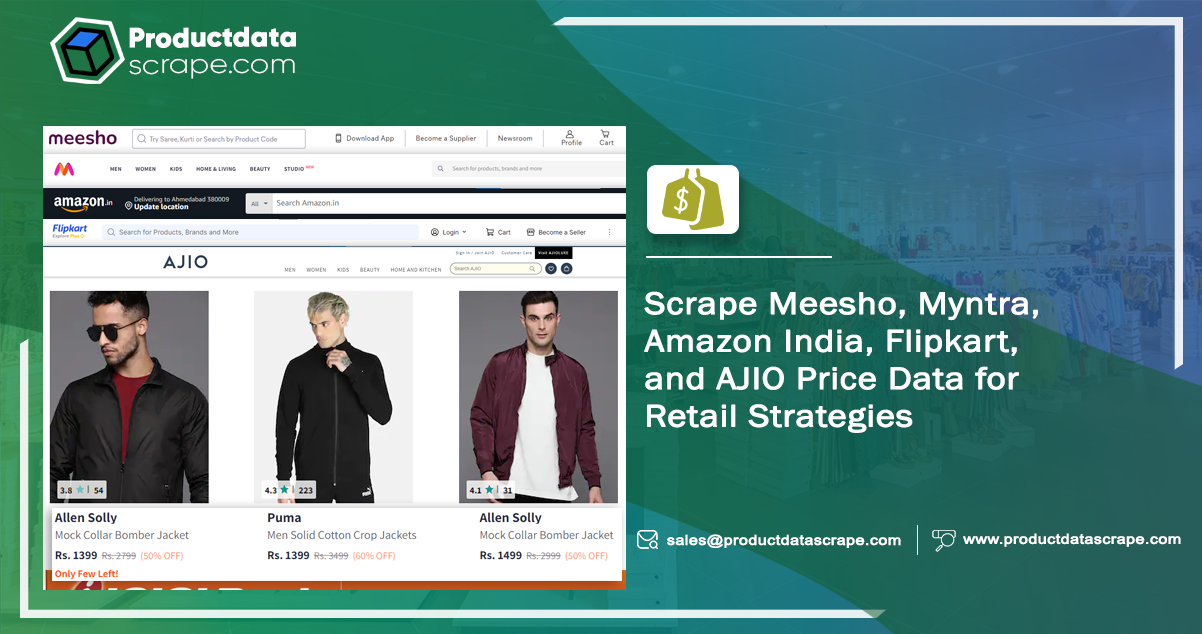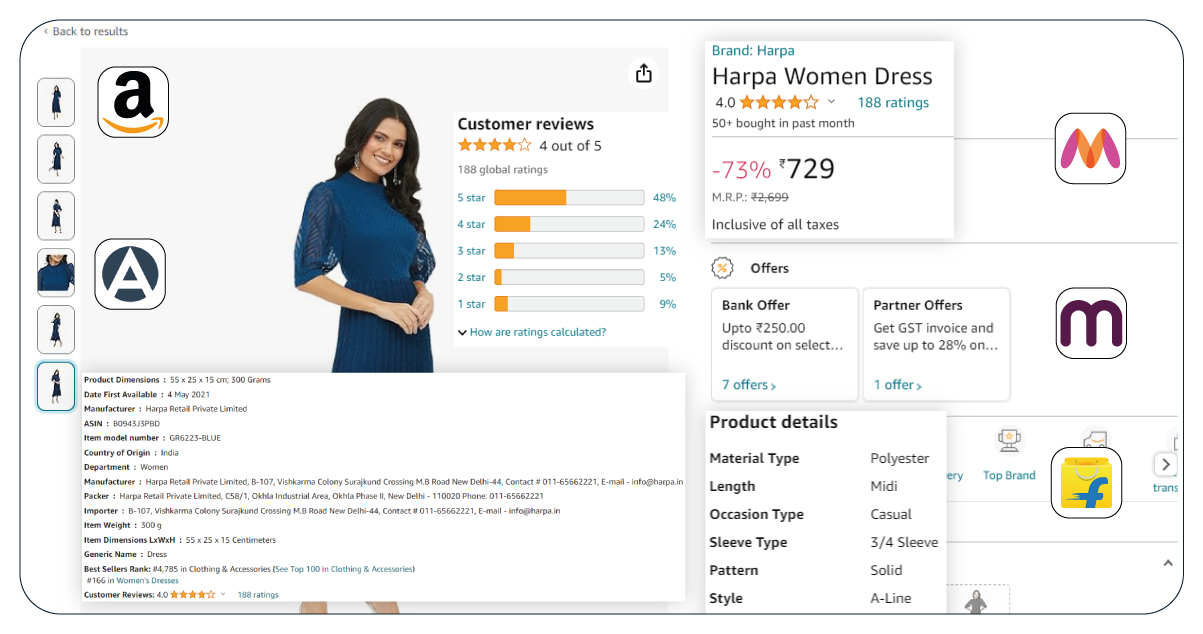
E-commerce data scraping involves the automated extraction of information from online platforms, offering a comprehensive understanding of various facets of the digital marketplace. This process can systematically collect crucial details such as product specifications, pricing dynamics, customer reviews, and inventory status. This wealth of data facilitates businesses in market analysis, competitive intelligence, and strategic decision-making. By harnessing the power of e-commerce web scraping, companies can gain insights into consumer behavior, identify emerging trends, and refine their offerings to meet market demands. However, it's essential to navigate legal and ethical considerations, respecting the terms of service of each platform. Implementing robust scraping techniques allows businesses to stay agile, adapt to market fluctuations, and maintain a competitive edge in the dynamic e-commerce landscape.
List of Data Fields

- Product Name
- Product Description
- Brand
- Model
- SKU
- Product Specification
- Pricing Details
- Stock Status
- Quantity Available
- Review Text
- Ratings
- Shipping Options
- Shipping Costs
- Product Images
- Technical Specifications
- URL Structures
Meesho: Meesho is an Indian social commerce platform enabling individuals to start online businesses with minimal investment. Founded in 2015 by Vidit Aatrey and Sanjeev Barnwal, Meesho connects suppliers with resellers, allowing resellers to showcase products on their social media networks and earn a commission on sales. Meesho primarily focuses on empowering women entrepreneurs and individuals in smaller towns and cities, providing them a platform to sell various products, including fashion, accessories, and home goods. The platform offers cataloging assistance, order management, and seamless payment options. Scrape Meesho product data through web scraping to gather information on products, prices, and details for analysis or specific purposes.

Myntra: Myntra is a prominent Indian e-commerce platform specializing in fashion and lifestyle products. Launched in 2007, it offers a vast array of clothing, footwear, accessories, and home decor from various brands. Myntra's user-friendly website and app provide a seamless shopping experience, with features like personalized recommendations and virtual try-on services. In 2014, it was acquired by Flipkart, bolstering its market presence. Myntra frequently collaborates with fashion designers and celebrities, enhancing its appeal. The platform has significantly shaped India's online fashion retail landscape, catering to diverse consumer preferences. You can scrape Myntra product data for detailed insights into their diverse fashion and lifestyle products. It includes pricing, availability, and specifications.

Amazon India: Amazon India is the subsidiary of the global e-commerce giant Amazon. Launched in 2013, it has grown to become one of the leading online marketplaces in the country. Amazon India offers many products, including electronics, clothing, books, and more. The platform provides customers various services, such as Amazon Prime, for fast shipping and exclusive content streaming. Amazon India has significantly shaped India's e-commerce landscape, providing millions of users with a convenient and diverse shopping experience. You can Scrape Amazon India product data for comprehensive insights into product details, pricing, and availability. It thus aids in the analysis of specific requirements.

Flipkart: Flipkart is a major Indian e-commerce company headquartered in Bengaluru, Karnataka. Founded in 2007 by Sachin Bansal and Binny Bansal, it quickly became one of the largest and most popular online marketplaces in India. Flipkart offers various products, including electronics, fashion, home appliances, books, and more. The company has played a crucial role in revolutionizing online shopping in India and has been known for innovations such as cash-on-delivery and its logistics network, Ekart. Scrape Flipkart product data for comprehensive insights into products, pricing, and availability, facilitating analysis or specific requirements in the e-commerce domain.

Ajio: AJIO is an Indian online fashion and lifestyle e-commerce platform. Launched by Reliance Retail in 2016, AJIO offers a diverse range of clothing, footwear, accessories, and home decor. Known for curating a mix of trendy and traditional styles, AJIO caters to a broad audience. The platform features Indian and international brands, providing a seamless shopping experience. AJIO also emphasizes technology integration, offering virtual trial rooms and AI-driven recommendations. Scrape Ajio product data to analyze and gather information on clothing, footwear, accessories, and home decor, including pricing, availability, and specifications.

Reasons for Scraping E-Commerce Data

Market Analysis: E-commerce data scraping gives businesses nuanced insights into prevailing market trends. It involves a deep dive into consumer preferences, allowing companies to discern patterns related to product choices and emerging demands. The data collected using e-commerce data scraping services enables businesses to stay ahead of market shifts and make informed decisions regarding their product offerings and marketing strategies.
Competitor Intelligence: The extraction of e-commerce data from competitors' websites is a strategic move that equips businesses with a comprehensive understanding of the competitive landscape. By staying informed about competitors' pricing strategies, new product launches, and innovative marketing tactics, companies can tailor their approaches for sustained competitiveness.
Pricing Optimization: Businesses can dynamically optimize their strategies by scraping pricing data from various e-commerce platforms. It ensures that companies remain competitive, adjusting their real-time pricing structures to maximize profitability and respond to changing market conditions.
Inventory Management: Real-time information on stock levels and product availability obtained through scraping plays a pivotal role in efficient inventory management. This data helps businesses avoid stockouts or overstock situations by allowing timely restocking decisions and adjusting inventory levels based on market demand.
Customer Behavior Analysis: Analyzing data using an e-commerce data scraper provides businesses valuable insights into customer behavior. It includes understanding which products are popular, identifying preferred features, and recognizing the factors influencing purchasing decisions. This information allows businesses to tailor their marketing efforts to target specific customer segments more effectively.
Enhanced Product Descriptions: Extracted e-commerce product data serves to enhance catalog descriptions. By ensuring accurate and comprehensive details about products, businesses can significantly improve the user experience. It, in turn, boosts customer confidence, as shoppers can make more informed purchasing decisions based on the enriched product information.
Strategic Decision-Making: Informed decision-making directly results from the insights derived from scraping e-commerce data. Businesses can identify opportunities, assess potential risks, and formulate effective growth strategies based on a thorough understanding of the market dynamics and consumer behavior.
Dynamic Adaptation: The ability to scrape Meesho, Myntra, Amazon India, Flipkart, and AJIO price data and analyze real-time data empowers businesses to adapt swiftly to market changes. Whether responding to pricing fluctuations, staying abreast of new product launches, or adjusting strategies based on shifts in consumer preferences, dynamic adaptation ensures companies remain agile and responsive in a rapidly evolving marketplace.
At Product Data Scrape, we maintain steadfast ethical standards across all operations, be it our Competitor Price Monitoring Services or Mobile App Data Scraping. With a worldwide presence spanning multiple offices, we consistently deliver exceptional and transparent services to meet the diverse needs of our valued clients.







































.webp)






